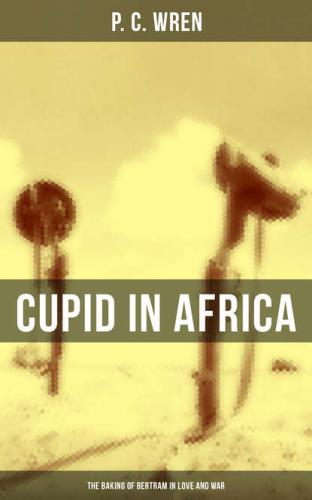P. C. Wren
Cupid in Africa: The Baking of Bertram in Love and War
Published by
Books
- Advanced Digital Solutions & High-Quality eBook Formatting -
2017 OK Publishing
ISBN 978-80-7583-805-6
Table of Contents
Chapter I. Major Hugh Walsingham Greene
Chapter II. Mr. Charles Stayne-Brooker (or Herr Karl Stein-Brücker)
Chapter III. Mrs. Stayne-Brooker—and Her Ex-Stepson
Part II. The Baking of Bertram By War
Chapter I. Bertram Becomes a Man of War
Chapter II. And is Ordered to East Africa
Chapter IV. Terra Marique Jactatus
Chapter V. Mrs. Stayne-Brooker
Chapter VIII. Military and Naval Manœuvres
Chapter IX. Bertram Invades Africa
Chapter XX. Stein-Brücker Meets Bertram Greene—and Death
Part III. The Baking of Bertram By Love
Chapter I. Mrs. Stayne-Brooker Again
“And the son shall take his father’s spear
And he shall avenge his father” . . .
—Askari Song
Part I.
The Making of Bertram
Chapter I.
Major Hugh Walsingham Greene
There never lived a more honourable, upright, scrupulous gentleman than Major Hugh Walsingham Greene, and there seldom lived a duller, narrower, more pompous or more irascible one.
Nor, when the Great War broke out, and gave him something fresh to do and to think about, were there many sadder and unhappier men. His had been a luckless and unfortunate life, what with his two wives and his one son; his excellent intentions and deplorable achievements; his kindly heart and harsh exterior; his narrow escapes of decoration, recognition and promotion.
At cards he was not lucky—and in love he . . . well—his first wife, whom he adored, died after a year of him; and his second ran away after three months of his society. She ran away with Mr. Charles Stayne-Brooker (elsewhere the Herr Doktor Karl Stein-Brücker), the man of all men, whom he particularly and peculiarly loathed. And his son, his only son and heir! The boy was a bitter disappointment to him, turning out badly—a poet, an artist, a musician, a wretched student and “intellectual,” a fellow who won prizes and scholarships and suchlike by the hatful, and never carried off, or even tried for, a “pot,” in his life. Took after his mother, poor boy, and was the first of the family, since God-knows-when, to grow up a dam’ civilian. Father fought and bled in Egypt, South Africa, Burma, China, India; grandfather in the Crimea and Mutiny, great-grandfather in the Peninsula and at Waterloo, ancestors with Marlborough, the Stuarts, Drake—scores of them: and this chap, his son, their descendant, a wretched creature of whom you could no more make a soldier than you could make a service saddle of a sow’s ear!
It was a comfort to the Major that he only saw the nincompoop on the rare occasions of his visits to England, when he honestly did his best to hide from the boy (who worshipped him) that he would sooner have seen him win one cup for boxing, than a hundred prizes for his confounded literature, art, music, classics, and study generally. To hide from the boy that the pæans of praise in his school reports were simply revolting—fit only for
